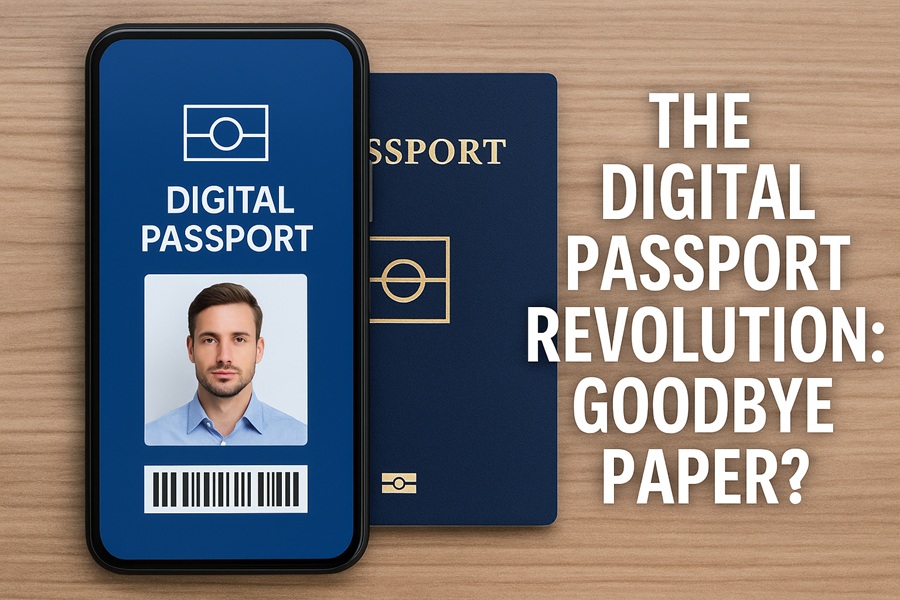For over a century, the passport book has been the universal key to crossing borders. But a major change is on the horizon: the rise of digital passports. Several countries are already experimenting with replacing - or at least supplementing - traditional paper passports with digital travel credentials stored on your phone. While this promises faster, more seamless travel, it also raises important questions about security, access, and privacy.
What Is a Digital Passport?
A digital passport (sometimes called a “Digital Travel Credential” or DTC) is an electronic version of your traditional passport that can be stored securely on your smartphone or in a digital wallet.
Instead of handing over a booklet to a border officer, your device would communicate your identity through encrypted systems and biometric verification, such as facial recognition or fingerprint scans.
Countries Leading the Way
- Finland: In 2023, Finland became the first country in the world to pilot digital passports with select travelers flying to the U.K.
- Canada & Netherlands: Both are running joint pilots with the International Civil Aviation Organization (ICAO) to explore digital passport standards.
- Singapore & Australia: Actively testing biometric-based travel that could phase out paper checks.
These trials are laying the groundwork for broader adoption in the coming years.
Benefits of Digital Passports
- Speed & Efficiency – Faster check-ins and border crossings with less paperwork.
- Contactless Travel – Especially important post-COVID, where touchless solutions reduce health risks.
- Reduced Fraud – Encrypted digital credentials can be harder to counterfeit than paper.
- Convenience – Everything stored on your phone means one less item to carry (or lose).
The Concerns & Risks
While the upside is appealing, travelers should be aware of the potential downsides:
- Privacy Risks: Digital passports rely heavily on biometrics and cloud systems. Who has access to this data, and how long is it stored?
- Cybersecurity Threats: Digital credentials could be targeted by hackers, making secure design and encryption absolutely critical.
- Technology Gaps: What happens if your phone dies, gets stolen, or malfunctions mid-trip? Backup systems will be essential.
- Global Standards: Not every country is ready or willing to accept digital passports, which could lead to confusion at borders.
Will Paper Passports Disappear?
Not anytime soon. Experts agree that traditional passport books will remain in use for years - possibly decades - while digital systems roll out gradually. Most likely, digital passports will first serve as a complement to paper, not a replacement.
Think of it like airline boarding passes: once only paper, now mostly digital, but paper is still available if you need it.
What Travelers Should Do Now
- Stay Informed: Follow news about pilots and adoption in your region.
- Update Your Devices: If digital passports expand, modern smartphones with biometric security will be key.
- Have a Backup: Even in a digital world, keeping your paper passport valid and safe remains essential.
- Consider Privacy: Understand that convenience may come at the cost of personal data security.
Q&A: Digital Passports
Q: Can I use a digital passport today?
A: Only if you're part of a limited pilot program. For now, paper passports are still required worldwide.
Q: Will I still need a physical passport if I have a digital one?
A: Yes. At least for the foreseeable future, you'll need both until international standards catch up.
Q: Are digital passports safer?
A: They may reduce fraud, but they introduce new risks like hacking and surveillance. Security depends on how well systems are designed and regulated.
Q: When will the U.S. adopt digital passports?
A: There's no confirmed timeline, but the U.S. is closely monitoring international pilots and is expected to explore its own trials in the coming years.
Final Word
The digital passport revolution is coming - but slowly. While the promise of faster, safer, and paper-free travel is exciting, it's important for travelers to stay aware of the privacy and security trade-offs. For now, keep your passport book safe - it's still the most reliable way to cross borders.


